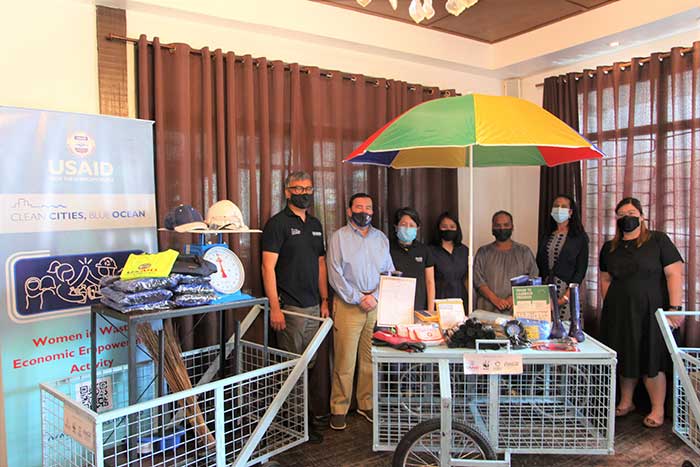
The U.S. Agency for International Development (USAID), through its Clean Cities, Blue Ocean (CCBO) program and its Women in Waste’s Economic Empowerment Activity, awarded its first business expansion grant to help a woman waste collector start her own door-to-door waste collection business.
In partnership with Coca-Cola Foundation Philippines, the Quezon City government, World Wide Fund for Nature Philippines (WWF-Philippines), and EcoWaste Coalition, USAID provided almost Php 50,000 ($888) worth of waste collection equipment to 34-year-old Riza Santoyo from Quezon City.
“We recognize that women in the waste sector are talented, hardworking, critical members of our global communities and deserve equal access to opportunities to establish or grow their waste livelihoods or businesses,” said USAID Philippines Deputy Mission Director Rebekah Eubanks.
The majority of women in the waste sector serve in informal positions as waste collectors, owners, or employees of small recycling centers, junk shops, and upcycling enterprises. These women are often underpaid and undervalued despite their contributions to preventing plastic litter from reaching the ocean.
“We are very proud of Riza for the business grant she received and for being an inspiration to us,” said Quezon City Mayor Joy Belmonte. “We also thank USAID, Coca-Cola Foundation Philippines, WWF-Philippines, and EcoWaste Coalition for being our partners in empowering and uplifting the lives of women waste collectors in our city.”
USAID’s Women in Waste’s Economic Empowerment Activity aims to level the playing field and empower women to become leaders in the sector and in their communities. Since 2021, USAID and its partners have supported 167 women in the waste sector by increasing access to training, mentoring, funding, and business opportunities.
“We are committed to helping Filipino women in the waste sector become successful entrepreneurs and improve their lives,” said Coca-Cola Foundation Philippines President Ma. Cecilia Alcantara.
USAID launched its CCBO program in August 2019 to respond to the ocean plastics pollution crisis. The five-year, Php 2.7 billion ($48 million) program works at the global level and in specific, rapidly urbanizing countries like the Philippines to address ocean plastics directly at their source. By strengthening waste management systems and building circular economies, city by city, the program builds sustainable solutions that reduce ocean plastics while empowering vulnerable populations and mitigating pollution that affects human health and the climate.




















